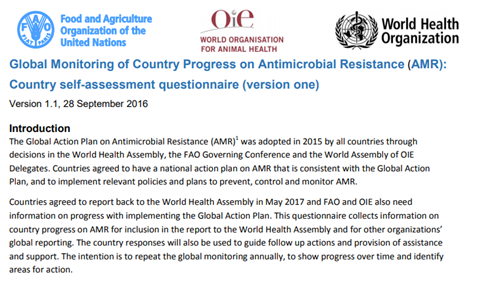Tripartite AMR Country Self-Assessment Survey (TrACSS) 2016-2017
Global monitoring of country progress on addressing antimicrobial resistance

Overview
The Global Action Plan on Antimicrobial Resistance (AMR) was adopted in 2015 by all countries through decisions in the World Health Assembly (WHA), the Food and Agriculture Organization of the United Nations (FAO) Governing Conference, and the World Assembly of the World Organisation for Animal Health (OIE) Delegates.
WHO, FAO and OIE developed a monitoring questionnaire to review and summarise country progress, which provided information for reporting at a global level. The country responses were used to guide follow-up actions and identify areas where assistance and support are required.
The questionnaire asked countries to assess their progress with multi-sectoral work on AMR, developing a national AMR action plan and implementing key actions to address AMR. The questionnaire included questions on progress in human health, animal health, crop production, food safety and the environment.
The questionnaire was designed to be completed through self-assessment at country level accompanied by a short guidance note, included below, which provided further information on the monitoring approach. Countries were encouraged to involve a multi-sectoral group in assessing national progress.
The questionnaire was sent out to countries by WHO through WHO regional and country offices, and was also widely circulated by FAO and OIE. Countries were asked to submit one consolidated, agreed response that addresses all sectors. This was the first round of annual monitoring. All responses can be accessed in the open tripartite database. Links to the surveys used in subsequent reporting years are provided below.
Additional Reporting Years
TrACSS 2020-2021 | TrACSS 2019-2020 | TrACSS 2018-2019 | TrACSS 2017-2018
